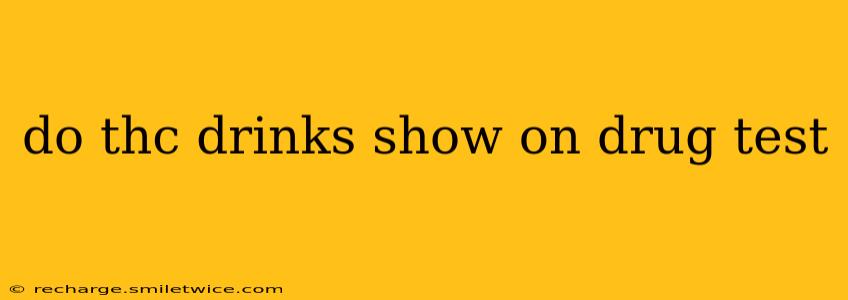The question of whether THC drinks show up on a drug test is a complex one, depending on several factors. While THC drinks are increasingly popular, understanding their potential impact on drug tests is crucial. This article will explore the science behind THC detection, the variables influencing test results, and what you can expect.
What are THC Drinks?
THC drinks contain tetrahydrocannabinol (THC), the primary psychoactive compound in cannabis. Unlike smoking or vaping, these drinks offer a different consumption method, often incorporating THC into infused beverages like sodas, teas, or even alcoholic mixes. The effects are similar to other forms of THC consumption, but the onset and duration may vary.
How Long Does THC Stay in Your System?
The length of time THC remains detectable in your system is highly variable and depends on several factors, including:
- Frequency of use: Regular users will generally have longer detection times than occasional users.
- Metabolism: Individual metabolic rates greatly influence how quickly THC is processed and eliminated.
- Body fat percentage: THC is fat-soluble, meaning it can be stored in body fat and released more slowly.
- THC concentration in the drink: Higher concentrations naturally lead to higher and longer detectable levels.
- Type of drug test: Different tests have varying sensitivities and detection windows.
Generally, THC can be detectable in urine for anywhere from a few days to several weeks, even months for heavy, chronic users. Blood tests typically detect THC for a shorter period, usually a few days. Hair follicle tests can detect THC for up to 90 days.
What Kind of Drug Test Will Be Used?
This significantly impacts detectability. The most common drug tests are:
- Urine tests: These are relatively inexpensive and widely used, detecting THC metabolites (breakdown products) which can remain in the urine for a considerable time.
- Blood tests: These are more expensive and less commonly used for routine drug screenings. They detect THC directly but have a shorter detection window.
- Saliva tests: These tests are becoming more prevalent and detect THC metabolites. The detection window is shorter than urine tests but longer than blood tests.
- Hair follicle tests: These are the most sensitive and have the longest detection window. They can detect THC metabolites for months.
Will a Single THC Drink Show Up on a Drug Test?
The answer depends on the factors mentioned above. A single, low-concentration THC drink consumed by someone with a fast metabolism and low body fat percentage might not show up on a drug test, particularly if tested a few days later. However, a high-concentration drink consumed by a regular user with a slower metabolism is far more likely to result in a positive test, even several days later.
Can I Pass a Drug Test After Consuming THC Drinks?
There's no guaranteed way to pass a drug test after consuming THC drinks. Abstinence is the most reliable method. However, some strategies people attempt include:
- Detox drinks: The effectiveness of these products is debated and not scientifically proven.
- Increased water intake: This might dilute the urine, but it's unreliable and could lead to a diluted specimen being flagged.
- Exercise: While exercise can help with overall health, it won't significantly impact THC elimination quickly enough to guarantee a negative test.
These methods are not foolproof and should not be relied upon.
How Can I Reduce the Risk of a Positive Test?
The best way to avoid a positive test is to abstain from THC consumption for a sufficient period before the test. If you're concerned about a potential drug test, it's best to consult a healthcare professional or a substance abuse specialist for personalized advice.
Disclaimer: This information is for educational purposes only and should not be considered medical or legal advice. The detection time of THC can vary significantly based on individual factors. Always consult with a healthcare professional or a substance abuse specialist if you have concerns about drug testing.
